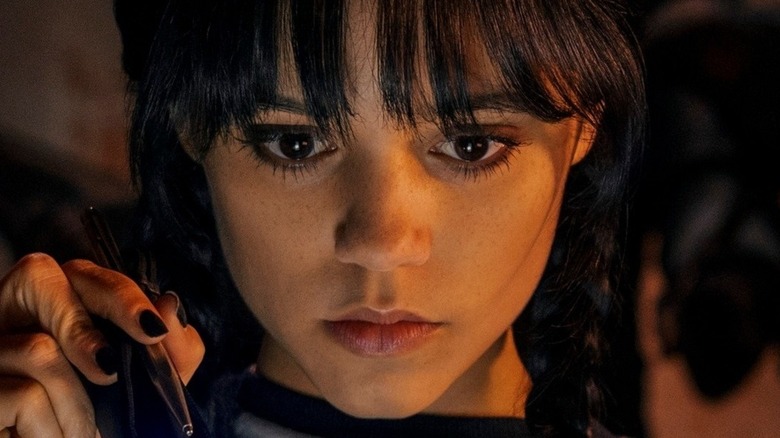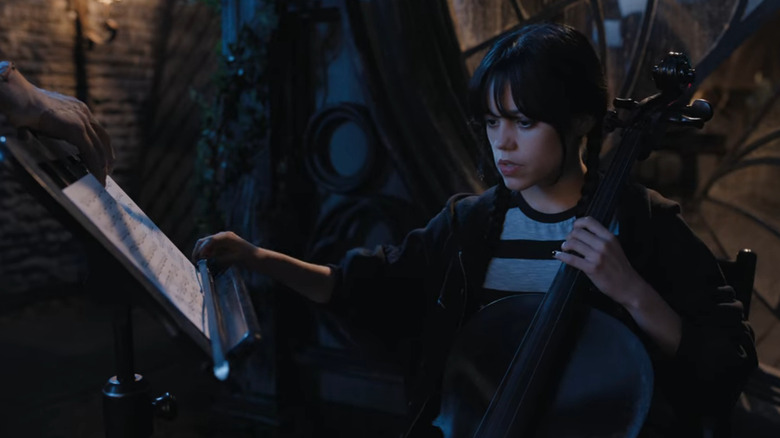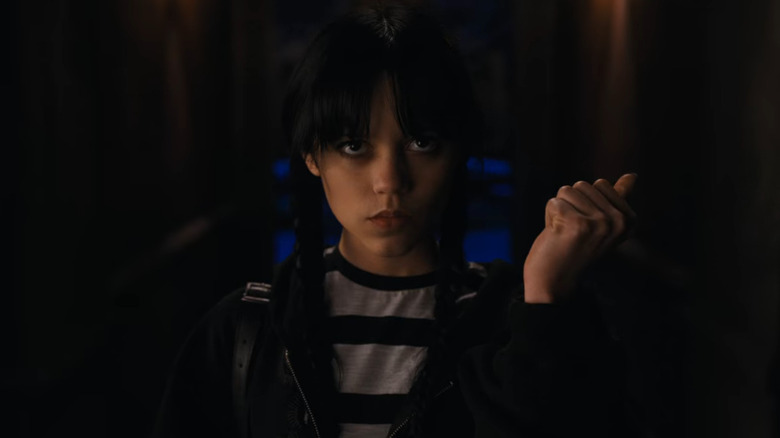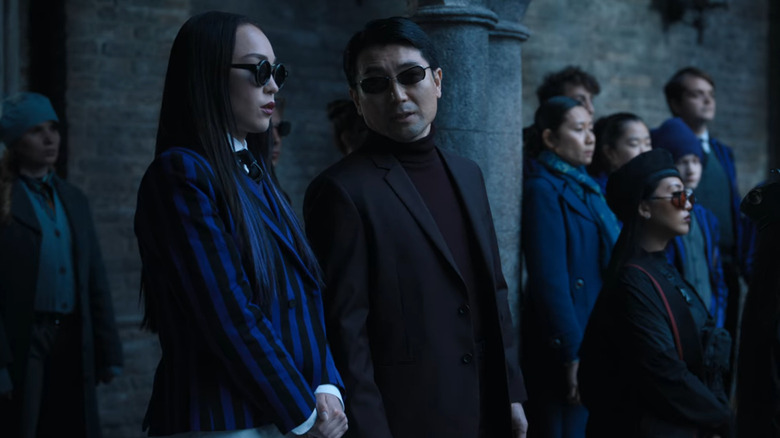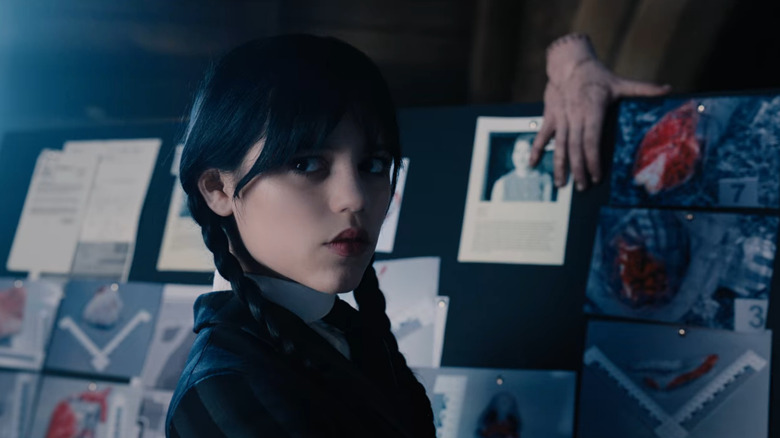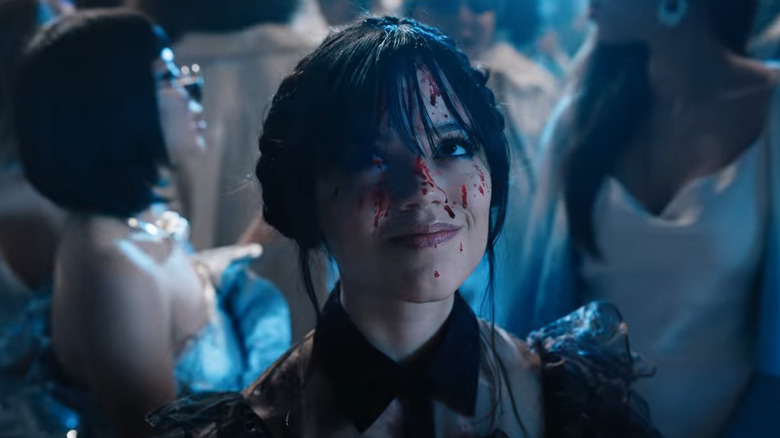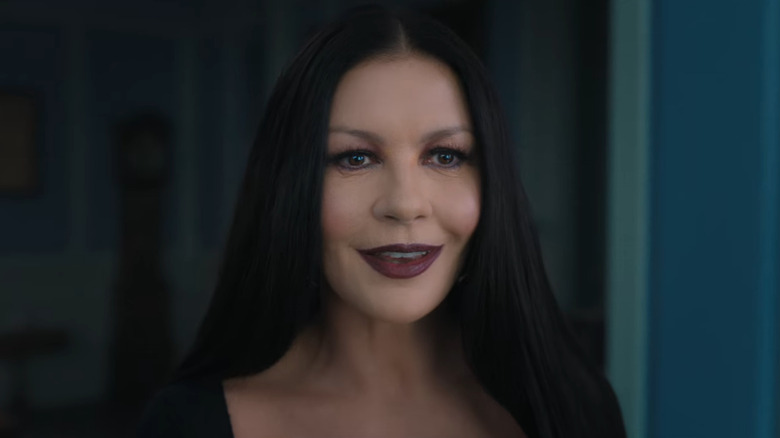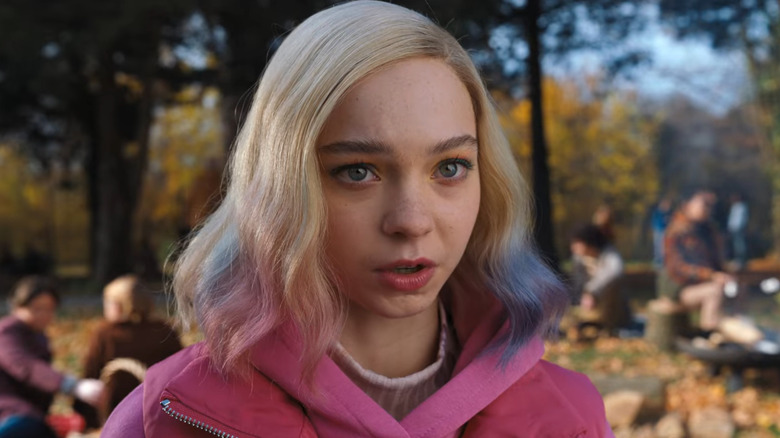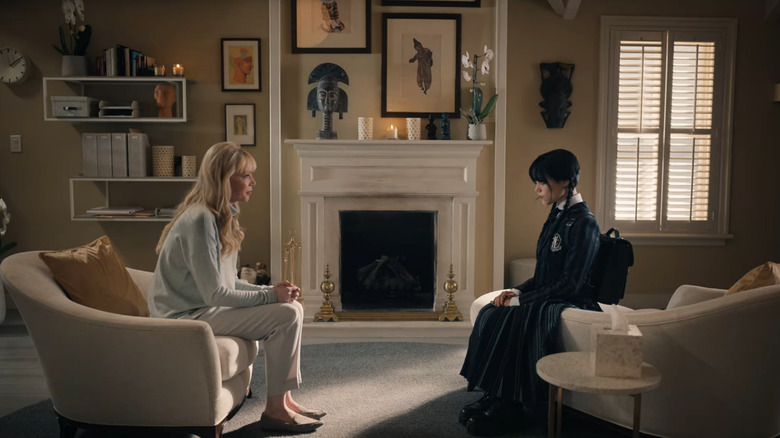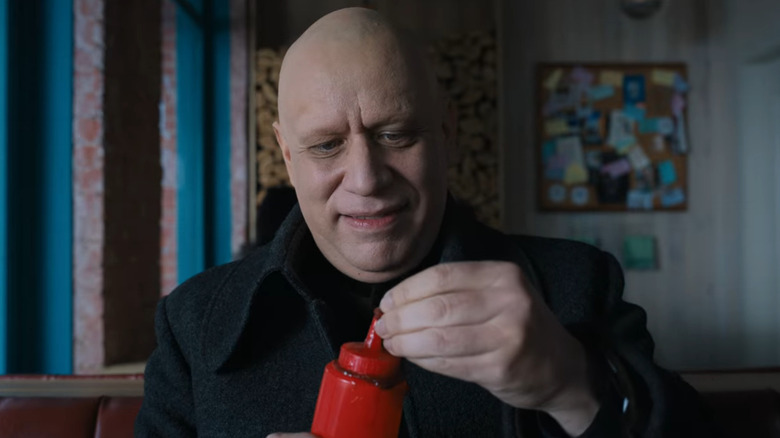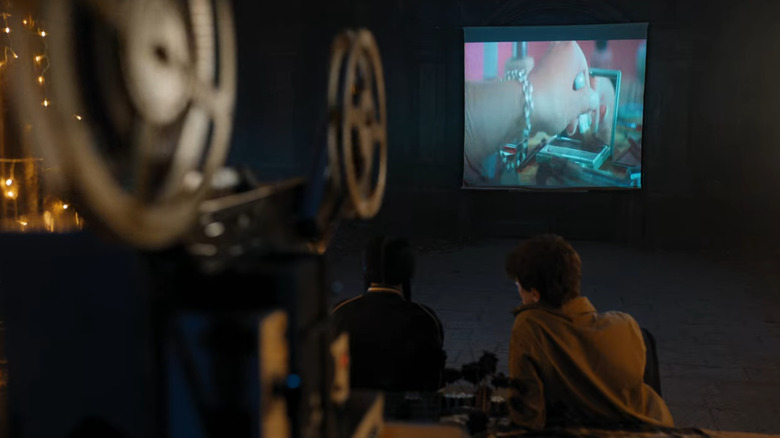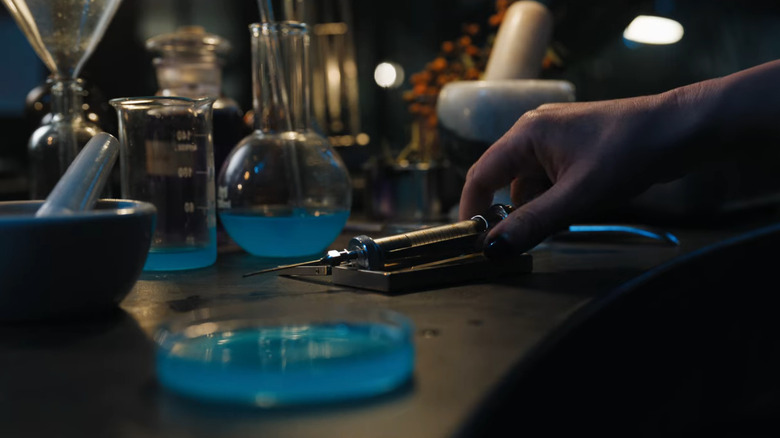Things Only Adults Notice In Wednesday
By now, pretty much everyone with Netflix access has seen the hit "Addams Family" adaptation "Wednesday." The reason for the show's immense popularity might be that it has a little bit of everything — mystery, gore, humor, fantasy, a splash of romance, a viral TikTok dance scene, and an extraordinary school full of outcasts and secrets. Combine that with incredible performances from Jenna Ortega and the rest of the cast and you get a fun murder mystery for older children and adults to enjoy.
While the younger crowd can get a nice laugh out of the nods to TikTok and Etsy, it's easy for them to miss out on the older references to pop culture icons or events that happened before they were born. They might also overlook the handful of scenes with messages that go beyond the story and address serious issues in real life. The adult audience, however, should be able to pick up on a lot more of the references and hidden details weaved into each episode of "Wednesday." Spoilers ahead.
Wednesday's cello cover of a Rolling Stones song
On a few different occasions, Wednesday is shown strumming away on her cello. Her most dramatic performance takes place on the balcony outside her dorm room in the first episode. Rather than going with a classical piece, she plays "Paint it Black" by The Rolling Stones. It's definitely an interesting choice to go with a rock song on the cello, but it's a perfect fit for someone like Wednesday, who loves the color black and brings the goth aesthetic to her shared dorm room with the very colorful and peppy Enid Sinclair.
As an iconic song from the 1960s, Wednesday's "Paint it Black" cover takes older viewers back to the same decade "The Addams Family" debuted as a TV sitcom. But, despite their Hall of Fame status, The Rolling Stones' music might not be as recognizable to kids who aren't familiar with the rock genre. And to take it a step further, the song becomes even harder to identify with Wednesday putting her own spin on it. Coincidence or not, the only two characters shown thoroughly enjoying her cello performance are Principal Weems and Ms. Thornhill, who are both well into adulthood.
Snapping twice
In Episode 2, Wednesday seeks to uncover the truth behind the artwork she picked up after Rowan's murder. She notices a faint watermark on the top corner of the page which she also spots on the Edgar Allan Poe statue on campus. As she reads the poem on his statue line by line, she solves a series of short riddles until she's left with the final answer — "snap twice." After Wednesday snaps twice, the statue is revealed to be a hidden entrance that leads to a library where the elite Nightshade Society gathers in secret. There, she finds an important book in her investigation before being captured and interrogated by the Nightshades.
The two snaps will serve as a reminder to anyone who's heard the original theme song from "The Addams Family." In fact, the snaps that accompany the tune are what make it so catchy and iconic. "Wednesday" has a similar but different theme song without the snaps, so it's very possible younger audience members won't realize that the snaps are a reference to the original. Kent, one of the Nightshades, even admits that he isn't aware of why they have to snap twice. This parallels younger viewers not being aware of what the snaps pay homage to.
Yoko resembles Yoko Ono
As Enid gives Wednesday a tour of Nevermore's campus, we get a glimpse of many cool characters, including Yoko, who is sitting with her vampire friends in the courtyard. Yoko doesn't get a chance to introduce herself then, but we learn a little more about the vampire throughout the series. In Episode 2, she has a bad allergic reaction after accidentally consuming garlic bread, which puts her out of commission for the upcoming rowing competition known as the Poe Cup. This intentional sabotage by Bianca forces Wednesday to fill in for Yoko and lead their team to victory in the competition. Additionally, Yoko serves as Enid's temporary roommate after the latter has a big argument with Wednesday at the end of Episode 6.
Despite her small supporting role in the show, Yoko still stands out for her appearance. She has long black hair and is usually seen wearing dark round shades to protect her vampire eyes from the sun. This style greatly resembles the one and only Yoko Ono, so it's certainly no coincidence that the Japanese vampire is named after her. Funnily enough, Yoko's dad resembles another pop culture icon when he makes a very brief appearance in Episode 5 during parents weekend at Nevermore. Her dad wears sunglasses, a turtleneck, and a blazer — much like Yoko Ono's late husband, John Lennon.
Ms. Thornhill is a familiar face
Marilyn Thornhill is introduced early on as Wednesday's dorm mom and botany teacher. She comes off as kind and motherly for most of the season, occasionally checking in on Wednesday to see how she's getting along with school and the ongoing murder mystery. By the season finale, the unassuming botany teacher is revealed to be Laurel Gates, the true villain pulling all the strings in the series of murders. Christina Ricci, the actor behind Ms. Thornhill, might portray one of the main antagonists in "Wednesday," but she also played Wednesday herself in the films "The Addams Family" (1991) and "Addams Family Values" (1993).
As the films are around three decades older than the Netflix series, younger "Wednesday" viewers wouldn't have known about Ricci's earlier ties to the character. Many took to Twitter to express their surprise when they were made aware that Ms. Thornhill was once Wednesday, much to the amusement of older viewers. "I can't believe some of y'all didn't realize that Ms. Thornhill is Christina Ricci, who played Wednesday Addams in the 90's?!" one fan tweeted (via Today). "Cause that was one of my fav things about it. Tim Burton is the man."
The Ted Bundy reference
Wednesday is the kind of girl who is intrigued by anything dark and mysterious, which is a big part of why she becomes so invested in the murders happening around Nevermore and Jericho. With her intuitive detective skills, fearless nature, and psychic visions, she knows solving the mystery is within her reach. As she collects more evidence and digs deeper into the investigation in Episode 4, she finds it useful to sort out all the photos and information onto a huge bulletin board in her shared room with Enid.
Enid sees Wednesday's board filled with the murder victims and their severed body parts and says, "When I suggested giving your side of the room a makeover, I did not have Ted Bundy's Pinterest in mind." Ted Bundy was a well-known serial killer in the 1970s whose name has resurfaced in recent years thanks to the 2019 docuseries "Conversations with a Killer: The Ted Bundy Tapes" and the 2019 film "Extremely Wicked, Shockingly Evil and Vile," based on his horrifying crimes. Seeing how both the docuseries and film are restricted to mature audiences, the younger crowd won't fully understand Enid's reference.
The bloody scene inspired by Carrie
Like many coming-of-age stories, "Wednesday" dedicates an episode to a school dance where everyone seems to be scrambling for a date. Wednesday initially has no intention of attending the dance but still ends up asking Xavier, who gladly accepts. He's over the moon about the invitation — until he learns that he's actually one of her suspects. Thing then takes it upon himself to ask Tyler to the dance on Wednesday's behalf without her knowledge.
As upset as she is with Thing for forcing her to attend the dance, Wednesday dances her heart out to "Goo Goo Muck" in the viral TikTok scene and she is delighted by the normie boys' bloody surprise. To sabotage Nevermore's dance, Lucas and his friends set the fire alarm off to trigger what appears to be blood raining down from the sprinklers. While everyone flees the scene in horror, Wednesday shows us a rare smile and tastes the "blood," which turns out to be red paint. She's disappointed that it isn't real pig's blood, a reference to Stephen King's '70s horror classic "Carrie," in which the titular character is drenched in pig's blood as she's crowned prom queen.
Morticia's controversial line in Episode 5
In Episode 5, Wednesday's family drops by for a visit during parents weekend at Nevermore. Although she doesn't have the best relationship with her parents, she uses this as an opportunity to figure out why her father has been accused of murder. Her parents keep quiet about the situation until Gomez is arrested, which prompts them to give Wednesday more context. Morticia explains that she had been stalked by Garrett Gates, who then attempted to kill Gomez. In self-defense, she stabbed Garrett, and Gomez willingly took the blame for it. Wednesday also has a vision that reveals Garrett had intended on using Nightshade poison to kill all the Nevermore students, but it ended up backfiring and he poisoned himself instead.
Morticia calls out the mayor for knowing Garrett's intentions and dismissing her pleas for help when she first reported his stalker behavior. She tells the mayor: "Men like you have no idea what it feels like not to be believed." While this line is intended to resonate with women and survivors of sexual assault who are so often silenced, it's very concerning when we think about who Morticia is speaking to — a Black man. With racism and racially-motivated crimes still being huge issues in today's society, Black people like the mayor definitely know what it feels like not to be believed. This didn't go unnoticed by viewers, who took to social media to express their concern.
The real-life equivalent of lycanthropy conversion camps
Wednesday isn't the only student who has a hard time when Nevermore's parents weekend rolls around. Bianca gets a surprise visit from her cult-driven mother, Xavier's father doesn't even bother to show his face, and Enid has to deal with her mother's constant disappointment in her. Enid admits to Wednesday early on in the series that she hasn't "wolfed out" yet and that she'll eventually be disowned from her werewolf pack if she fails to do so.
When Enid's parents visit over the weekend, her mother is especially upset that she has yet to wolf out. As a "gift," her mother hands her a bunch of brochures for werewolf conversion therapy under the guise of various summer camps. This disgusts Enid, who simply wants to be accepted for who she is despite how abnormal she might appear in her mother's eyes. Thankfully, by the end of the weekend, Enid stands her ground and refuses to go to the camps, which are intended to parallel the cruel and homophobic conversion therapy camps that exist in the real world.
The emphasis on therapy for teens
A prominent character and suspect throughout Season 1 is Dr. Kinbott, Wednesday's gentle and understanding therapist. She encourages the stoic Wednesday to open up about topics like her novel, her relationship with her mother, and her connection to the murders. The whole family also joins in for a group session, though it quickly turns into Wednesday interrogating her father about being a murder suspect.
In addition to having meetings with Wednesday and her family, Dr. Kinbott also sees Xavier and Tyler. Xavier meets with her to discuss his visions, such as the one that predicts her gruesome murder. Xavier's famous father requests that the therapy sessions take place away from Dr. Kinbott's usual office as a way to prevent the media from exposing his troubled son's issues. Meanwhile, Tyler sees Dr. Kinbott to work through his mother's death.
Although therapy doesn't exactly save Tyler from his eventual fate, all of Dr. Kinbott's sessions show that it's normal for teens to need help and guidance at their age, whether they're "normies," "outcasts," or from a privileged family. The fact that Xavier's father tries to hide his therapy sessions only adds to the stigma around mental health and doesn't help in normalizing the idea of seeking help.
The change to Uncle Fester from the original TV series
Uncle Fester makes his debut in "Wednesday" during Episode 7 when Wednesday notices someone stalking her. She quickly realizes it's just her beloved uncle and gives him the biggest smile we've seen in the series so far, a clear indicator that she feels more comfortable around him than most other people. During his short stay, Uncle Fester helps Wednesday identify the murderous monster as a hyde, takes her for a ride on his dalmatian motorcycle, and saves Thing after a brutal stabbing incident.
Uncle Fester also mentions that his brother, Wednesday's father, was the smart one who attended Nevermore while he'd only drop by for a visit every now and then. Interestingly enough, the 1960s sitcom version of Uncle Fester is related to Wednesday in a slightly different way. Rather than being the brother of Wednesday's father, Gomez, the older version of Uncle Fester was actually Morticia's uncle, making him Wednesday's great-uncle. This is a small detail that will probably go unnoticed by anyone who hasn't seen the original sitcom.
The Legally Blonde movie night
Throughout the season, there's a hinted possible romance between Wednesday and the Sheriff's normie son, Tyler. The two form a close friendship which leads to them attending Nevermore's dance together and a confession from Tyler later on. When the boy finally secures a date with Wednesday, he takes her to Crackstone's crypt, which is decorated in fairy lights. He's prepared a picnic and a scary movie for her. The "scary" movie turns out to be "Legally Blonde," a comedy from the early 2000s about a fun-loving sorority girl who gets into Harvard and proves to be a better lawyer than everyone judged her to be.
Reese Witherspoon's character, Elle Woods, is quite the opposite of Wednesday — cheerful, outgoing, and known for her bright pink outfits. Perhaps the only similarity between the two characters is that they both succeed in solving a murder case. Because of their stark differences, Wednesday makes a disgusted face throughout the movie and admits to Tyler that it was torture (but still thanks him) after it's over. If she ever wants to watch another "scary" movie from the 2000s, she should consider "Mean Girls," where the number one rule is to wear pink on Wednesdays.
The ending is similar to Zootopia
As Wednesday gets closer to uncovering the truth behind the murders, it starts to look a lot like Xaiver is the monster and Dr. Kinbott is the mastermind behind it all. Wednesday confronts both of them, which gets Xaiver arrested and leaves Dr. Kinbott as the monster's next victim. It isn't until Wednesday kisses Tyler that she realizes he's the actual hyde monster. Similarly, she doesn't suspect Marilyn Thornhill to be the big bad until Eugene mentions that he saw the suspect wearing red boots. The entire time, Marilyn is practically a wolf in sheep's clothing, pretending to be kind to Wednesday and the Nevermore students while secretly plotting their demise. Coincidentally, this is very similar to the plot twist in "Zootopia," in which the sweet little sheep, Assistant Mayor Bellwether, is the real antagonist.
For starters, Marilyn and Bellwether share the same glasses and motherly fashion sense. They even both utilize dangerous blue flowers in liquid form — nightshades in "Wednesday" and night howlers in "Zootopia." During the climax of "Wednesday," Marilyn stabs Principal Weems in the neck with the nightshade poison, while in "Zootopia," Bellwether attempts to shoot Nick in the neck with a dose of night howler serum. And to top it off, Marilyn intended on framing innocent outcasts like Xavier for the murders, while Bellwether almost got away with painting the innocent predator animals as the bad guys. There are some unusual yet undeniable similarities between the two. While younger viewers may have seen "Zootopia," it's their parents who will likely be connecting the dots.
